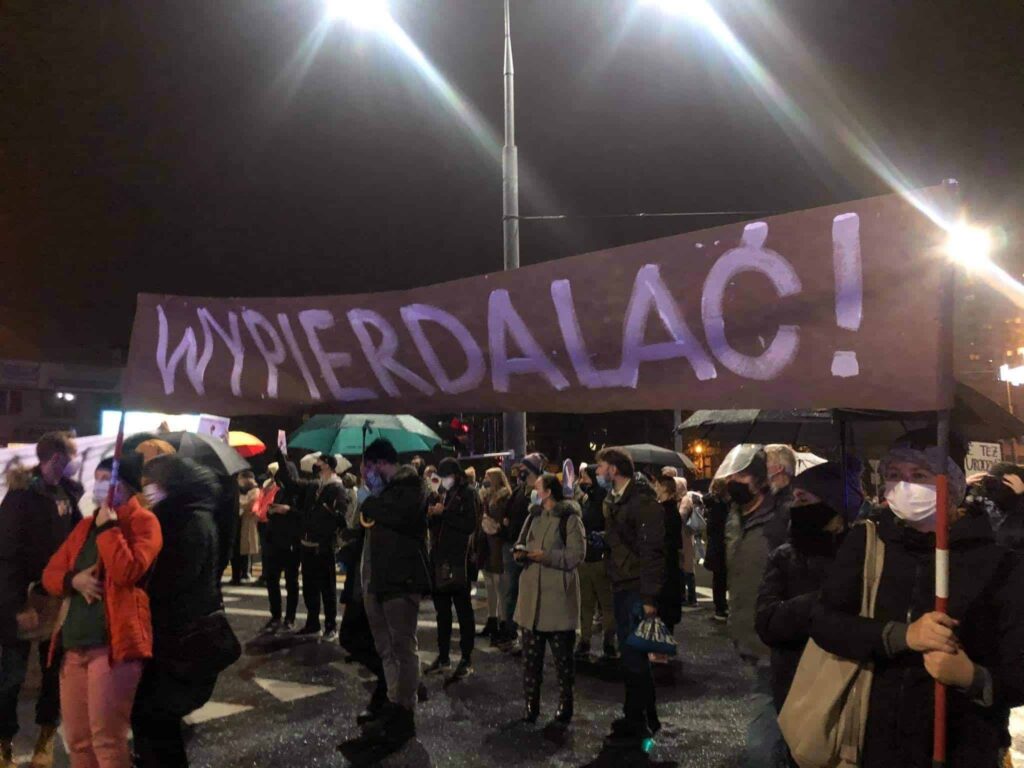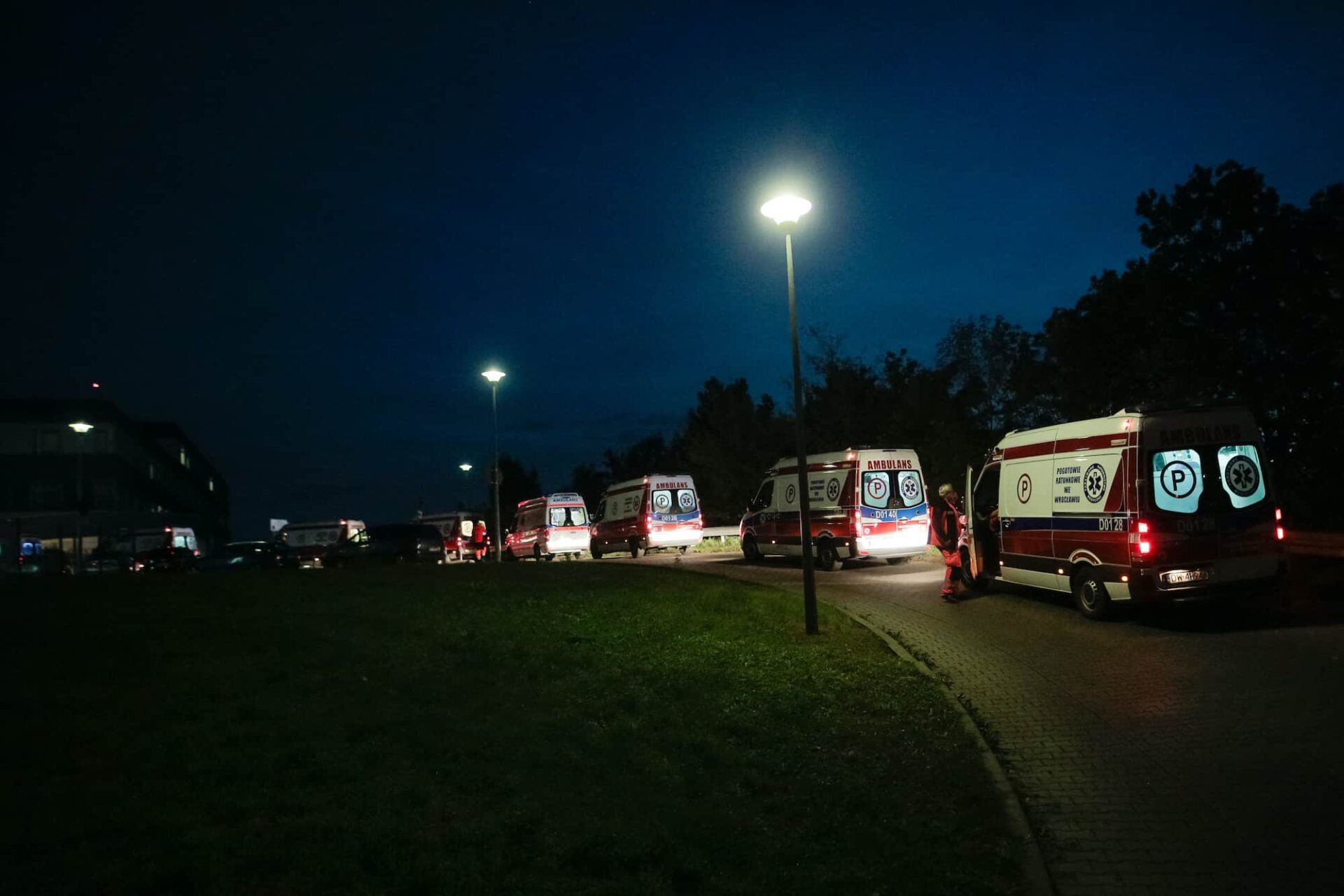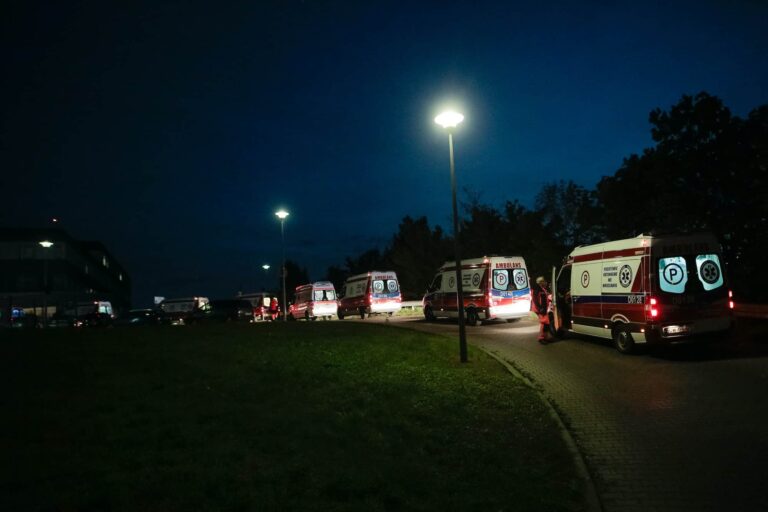“I am happy to see that we are less and less afraid of this virus and this pandemic. That’s good because the virus is in retreat. We don’t need to be afraid anymore” – said Polish Prime Minister Mateusz Morawiecki on July 1st in Tomaszów Mazowiecki during a campaign rally, before the upcoming presidential election. On that day there were 382 new cases of COVID-19 in Poland.
Exactly 5 months later, we had 17171 new cases and 152 deaths in one day. It is now, more than ever, clear that the PM was wrong. The virus in Poland was never in retreat. We needed to be afraid and careful. The state surely did need to act. They didn’t.
The election
Poland was among one of the first countries to impose severe restrictions at the beginning of the pandemic. A nationwide lock-down started on March 14th, 10 days after the first confirmed case. The combined measures of closed borders, a sudden halting of the economy and public self-discipline got Poland through the first months of the pandemic in a relatively successful manner. Łukasz Szumowski, the then Minister of Health, was on top of public trust rankings. How did we get to being the 7th country in the world with the highest new COVID case rate just 5 months later?
The numbers stabilized during the summer (at around 300 per day). Towards the end of April, all EU countries started lifting restrictions. Poland among them. This should have been the time to prepare for what was to come.
Instead, the government’s focus shifted from coronavirus to the upcoming presidential elections scheduled for May 10th. Jarosław Kaczyński, leader of the ruling Law and Justice Party (PiS), pushed for this date despite the health hazards because the pandemic and following economic crisis could threaten the reelection of their candidate, Andrzej Duda.
The idea of an all-mail-in election was strongly criticized by constitutional law experts, the opposition and the general public – but Kaczyński was adamant. Only the resistance of his own coalition partner forced PiS to postpone the elections at the last moment with the voting cards already printed and the whole process costing 70 million PLN.
Kaczyński knew that the pandemic was serious enough to change the results of the election. A complete victory against the virus was part of the campaign. So the government lifted almost all restrictions, with health and public safety proving to be less important than winning a vote.
Dębica. Dziękuję za spotkanie. Proszę Was o głos 12 lipca! #ŁączyNasPolska ✌️?? pic.twitter.com/ppunqF0SXL
— Andrzej Duda (@AndrzejDuda) July 10, 2020
Prominent politicians called for social distancing and participated in big campaign rallies at the same time. Kaczyński visited his mother’s grave in the middle of the lockdown, when all cemeteries in Poland were closed. On the anniversary of the Smoleńsk plane crash leaders of the ruling party appeared publicly without wearing face masks, which at the time was against the law. The President himself said that he “doesn’t like to wear masks”. The day before the election a nationwide SMS alert was sent out encouraging everyone, especially the elderly, to vote (even though this service should be used only in cases of emergency).
In the end Andrzej Duda was reelected on July 12th and the presidential race of 2020 was one of the key factors in undermining public self-discipline and social distancing in Poland.
The Strategist
On the day of the election we reported 370 new cases of COVID-19. There was still time to prepare for the next few months. On July 20th Łukasz Szumowski, the Minister of Health created a special taskforce to devise a strategy – yet unfortunately, its 13 members consisted of 10 officials and only 3 doctors.
Szumowski himself, viewed by many as a hero from the first days of the pandemic, soon lost public trust because of serious accusations of nepotism in allocating government funds and buying medical equipment from dubious sources. 5 million PLN were spent on masks that didn’t have any medical certification. And who was the supplier? A friend of Łukasz Szumowski, a skiing coach from Zakopane without any prior experience in medical supply trade.
Then the ministry ordered 1241 respirators from E&K company owned by Andrzej Izdebski. The contract amounted to an exorbitant 200 million PLN. The Ministry paid over 200,000 for a single device – which has a regular market price of around 70,000. This supplier also had no experience in medical trade whatsoever. Instead Izdebski was known as a weapons dealer. In 2001 the United Nations put his name on the black list of suspects of illegal weapon trade.
In the end out of 1241 respirators ordered six months ago only 200 made to Poland. The contract was broken, with Izdebski’s company still owing the Ministry over 70 million PLN.
On August 7th, Szumowski insisted that it was “no time to even discuss abandoning ship”.
He resigned just 11 days later. For 8 days, in the middle of a global pandemic, Poland did not have a Minister of Health.
Upon his resignation, Szumowski said: “I prepared the entire strategy for autumn. The report contains simple, consistent and feasible recommendations written by experts [from the taskforce]”.
The ePaństwo Foundation asked the ministry for any documents concerning this so-called strategy. The response contained only one 6-page list of general guidelines without any specific solutions or risk assessment. The Ministry admitted that this was the only document available. It was written on October 9th – 3 weeks after Szumowski’s resignation. Krzysztof Izdebski, an ePaństwo Foundation board member concluded: “There was no strategy, no plans. We now have an official confirmation: this was just a lie”.
What could’ve been done?
The handling of the pandemic has glaringly revealed a pertaining problem in Polish politics: the severe scarcity of any analytical and scientific backup to support policy. Many problems, infections and deaths could have been avoided with actions that scientists and experts have been recommending for months.
One issue is in support for the Sanitary Inspection. SI is directly responsible for handling infectious diseases. It has never faced a crisis of this magnitude. For years it has been underfunded and understaffed as its main role focused on food and workplace safety. Now SI is responsible for managing the entire quarantine process (currently there are over 400 thousand quarantined in Poland). Yet even at the time of writing it has not received adequate support to manage this. A lot of people go through the 10-day quarantine without even receiving a phone call from SI.

Source: www.gov.pl
Another issue is contact tracing – which is also the responsibility of the now overwhelmed Sanitary Inspection. I have been through COVID-19, and have witnessed this first hand. The entire contact tracing system came down to two questions: who do I work with and who do I live with. An official then needed to make the next call. But according to data, this system is virtually non-existent in Poland. In June the government spent 2.5 million PLN to develop a smartphone app for contact tracing – ProteGO Safe. For the last two and a half months it has been used by… 72 people.
Thirdly, there are issues in COVID-specific hospitals. In the early days of the pandemic several hospitals in the country were dedicated to treating only COVID patients. Over summer, as cases fell, everything went back to normal – but even by August 2nd immunologist Paweł Grzesiowski advised that we need to continue this approach. The Ministry finally announced the return of COVID-specific hospitals – over 2 months later.
Field hospitals and training personnel have also had serious issues. On October 8th, in an interview with TOK FM radio station, Paweł Grzesiowski said: “We need temporary field hospitals and doctors to run them. We have to consider hiring medical students with some prior training”.
Three weeks later, the PM and the new Minister of Health, Adam Niedzielski opened the first stage of a temporary hospital on the grounds of the National Stadium in Warsaw. With just 300 additional beds (despite plans for 1000), the hospital was in stark contrast to the grandeur of the stadium – and Niedzielski’s hopes: “One month ago the idea of temporary hospitals was just a worst-case scenario, it seemed very far away from us. Now it’s not a backup, it’s a real solution”.
Today, PM @MorawieckiM visited the first field hospital? at the @PGENarodowy Stadium. National Hospital is being prepared to treat even 1⃣2⃣0⃣0⃣ patients. pic.twitter.com/SnpDiV5wX9
— Chancellery of the Prime Minister of Poland (@PremierRP_en) October 29, 2020
Temporary hospitals are to be built in each voivodeship. Right now Warsaw has the only one. Yet even a week after the grand opening it still couldn’t admit patients because it didn’t meet legal requirements, and the government has only just started working on a separate legislation for temporary hospitals.
Then there is the problem of equipment. Poland still has not joined the EU programme that allows countries to buy respirators. And it’s not only respirators which are scarce. Every day we receive reports of staff lacking PPE, equipment and hospital beds – despite statistics from the Ministry which say otherwise. On November 3rd a 26-year-old man died in a hospital in Włoszczowa after waiting several hours for admittance.
Flu shots, which could have played a key role in relieving the healthcare system, are also causing issues. The early symptoms of COVID and of standard flu are almost identical. This means that flu patients will crowd clinics and require testing for COVID. The solution was to vaccinate the majority of the population. Unfortunately Poland ordered only 2.5 million doses of the vaccine. Now, hundreds of people ask for the common flu shot in pharmacies everyday.
Communication. Both medical and political science experts have urged the government to publish their strategies and plans well in advance. This creates a feeling of control and trust and allows businesses to better adjust to the restrictions. Nonetheless, the release of information at short notice is still a trademark of the Polish government’s approach to the pandemic. A bill with new restrictions from October 23rd was published at 11:10 PM, 50 minutes before coming into effect at midnight. One lawyer jokingly mentioned that this might be the world record for shortest vacatio legis in history.
School.com
Instead of devising comprehensive strategies and implementing such solutions beforehand, the ruling party was occupied with a political skirmish inside the coalition for the best part of the summer.
Law and Justice leaders were looking for distractions. Once again LGBT rights issues were used as a perfect coverup. On August 7th the police arrested Margot Szutowicz, a non-binary LGBT+ activist. It inspired a wave of protests and homophobia from ruling party officials.
Of the most important and carefully debated pieces of legislation in 2020 only one concerned COVID – and it didn’t have anything to do with fighting the pandemic. It was a bill which absolved state officials from any responsibility for mishandling the pandemic. If it passed any crime would no longer be considered a crime if it occured to combat COVID-19 and in the “public interest”. From buying medical equipment from friends or arms dealers to organizing illegal mail-in elections – this bill would eradicate all the government’s liability in an instant. This legislation started a two-week battle in parliament between the Law and Justice Party and the other coalition members.
This led to an even longer process of reshaping the Council of Ministers. A small number of structural and personal changes (of which the most significant was Jarosław Kaczyński becoming Deputy Prime Minister) were stretched over two weeks and consumed the government’s attention.
Among the most controversial nominees was Przemysław Czarnek, the newly appointed Minister of Education. He is now notorious for his homophobic and xenophobic views – earlier this year he publically claimed that LGBT people are “not equal to normal people”.
Czarnek and his predecessor, Dariusz Piontkowski, were responsible for looking after Polish education in the face of the pandemic. During the spring lockdown all schools operated on-line – a strategy which resulted in a lot of problems for students. The ministry was adamant that students should go back to the classrooms on September 1st. They failed to prepare any system for the worst-case scenario of rising coronavirus infections.
Jadwiga Jarosz, a teacher, said “nothing effective has been done. Before the summer break we were asked to report if our students need any equipment, computers, etc. We gathered the info and that was it. The Ministry provided nothing, we let the children use the school’s equipment just to make do. Some students have one computer per household or they don’t have access to the Internet.”
“What could have been done?”
“Apart from financing equipment and software? Supporting the teachers. Many teachers could use some training in online teaching. Equipment as well. I had to do everything by myself. I teach from my own personal computer, I made many unnecessary mistakes. This should have been avoided.”
On October 9th Niedzielski claimed that closing down schools was very unlikely. But despite those claims, the worst-case scenario came to pass..
On November 4th the Prime Minister announced that lessons on all levels of education will be held on-line. Schools are now closed once again, and they don’t seem any more ready for this than they were in spring.
Panic
Mathematical models and experts predicted a dramatic rise in coronavirus cases in autumn and winter. Polish officials have long denied this. In July Deputy Health Minister Waldemar Kraska said: “I don’t believe the prognosis of 800 new cases per day at the end of August”.
On August 29th, there were 759 cases and 14 deaths.
The phrase “second wave of the pandemic” has appeared at every press conference for the past few weeks. This is false. There is no second wave, because the first one never ended. The virus was never in retreat. Statistics clearly show that we didn’t observe any significant drop in the number of new cases. The turning point was October. With the start of autumn (in accordance with prognosis) numbers started to soar.
October 1st – 1967 new cases, 30 deaths.
October 31st – 21 897 new cases, 280 deaths.
The lack of preparedness, the preoccupation with political forays and skyrocketing numbers of COVID cases has now caused public outrage. And the government have started imposing some restrictions – whilst still trying to avoid a complete lockdown which would be disastrous for the economy.
Unfortunately restrictions often seem chaotic, ill-targeted, and the legislation is full of loopholes and errors. On October 16th, the government imposed a ban on gyms, swimming pools and fitness centres, which unexpectedly doesn’t affect dance schools and climbing gyms. All Polish restaurants are closed, but churches are still open. In the beginning of October the numbers were spiking, but you could still legally hold a wedding for 150 people. The lack of any logic behind some of the regulations causes distrust. In times of a public health crisis this trust and consistency is absolutely crucial.
At the same time the Ministry of Health has issued two different “pandemic strategies” in the last two months alone. Two weeks ago the Prime Minister said that a total lockdown was out of the question – and now he has admitted that we’re on a straight path to a national lockdown. Poland does not have the money for this. At the beginning of this year, the PM announced the first zero-deficit budget in the history of Poland. According to the latest reports, Poland’s deficit will amount to 110 billion PLN – the highest of all EU countries.
Hunger Games
On October 22nd there were 12,207 new cases of coronavirus confirmed – an all-time record at the time. It seemed like the government finally appreciated the gravity of the situation.
On the same day the Constitutional Tribunal issued a verdict imposing a near-total ban on abortion in Poland. The Tribunal, controlled by the Law and Justice Party, a declared that abortions in instances where a foetus is diagnosed with a serious and irreversible birth defect (98 percent of all legal abortions in Poland) are unconstitutional. Kaczyński used the Tribunal to bypass parliamentary debate. This ruling makes Poland’s abortion laws one of the strictest in any rich country of the world.

Protest in Warsaw, October 23, 2020 photo: VSquare
The Tribunal’s decision was meant to antagonize society and distract attention from the healthcare system crisis. Public outrage was not unexpected, but the scale surprised commentators around the world. For more than two weeks thousands of young Poles fought for women’s rights and against the PiS government. On October 30th over 100 thousand people marched on the streets of Warsaw. It was the biggest demonstration since the fall of communism in 1989.
Sadly, this is just another part of the same scenario. Instead of dealing with the pandemic, Poland’s leaders try to cover it up with one distraction after another. The presidential campaign, the reconstruction of the government, the fight for power inside the coalition, controversial bills that have nothing to do with healthcare or aiding the economy. And now Kaczyński, bypassing any debate, virtually banned the abortion in Poland, changing a law which had been standing for 27 years. In the middle of the pandemic he forced thousands of women on the streets to fight for their fundamental rights.
A parliamentary crisis followed. On November 3rd members of the ruling party decided to postpone the next session of the Parliament by two weeks. The party is waiting for the demonstrations to die down. But that means two weeks without new legislation in the middle of the biggest health crisis in decades. The political “Hunger Games” once again proved to be more important than public interest. Except this time the game has real lives at stake. To be precise, 373 lives have been lost just on the day of writing.
Cover photo: Wroclaw, 08.10.2020. Long queues of ambulances waiting for place in a hospital Fot: Krzysztof Zatycki/Forum
A freelance journalist, regularly published by “Tygodnik Powszechny”. Previously worked for i.a. “Gazeta Wyborcza”, “Newsweek”. Part-time traveller and mountaineer. Based in Cracow, Poland.






